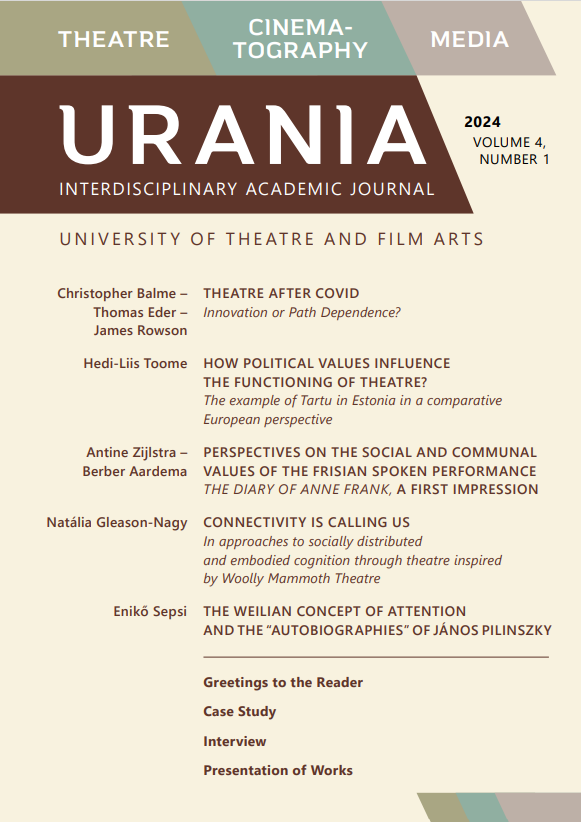Theatre after Covid
Innovation or Path Dependence?
Abstract
Drawing on a mixed methods approach, this paper will present findings from survey data and discourse analysis of materials gathered in the UK, Germany, Switzerland and Austria. It asks the question whether the exogenous shock brought about by the Covid pandemic has prompted theatres to innovate. Starting from the theory of path dependence which suggests that institutional change is extremely difficult, the paper will argue that preliminary findings do indeed point to transformations that affect both technological and institutional dimensions of theatre, particularly in the field of digital infrastructure and knowhow. The differences vary, however, considerably across the countries and theatre systems surveyed which provide a point of departure for a discussion on systemic differences. The surveys also provide some surprising results concerning work satisfaction and income as support programmes ensured that theatre workers could survive and in fact reduced pressure to produce and perform on schedules that were often deemed unsustainable.
References
Aebischer, Pascale and Rachael Nicholas. 2020. Digital Theatre Transformation: A case study and digital toolkit. Exeter: Exeter University Press.
Balme, Christopher. 2021. “Covid, Crisis and Prognosis: Prospecting the Future of Theatre”. Forum Modernes Theater 32(2): 178–191. https://doi.org/10.1353/fmt.2021.0016
Banks, Mark and Justin O’Connor. 2021. “‘A plague upon your howling’: art and culture in the viral emergency”. Cultural Trends 30(1): 3–18. https://doi.org/10.1080/09548963.2020.1827931
Bissell, Laura and Lucy Weir eds. 2022. Performance in a Pandemic. London: Routledge.
Chatzichristodoulou, Maria, Kevin Brown, Nick Hunt, Peter Kuling, and Toni Sant. 2022. “Covid-19: theatre goes digital – provocations”. International Journal of Performance Arts and Digital Media 18(1): 1–6. https://doi.org/10.1080/14794713.2022.2040095
Comunian, Roberta and Lauren England. 2020. “Creative and cultural work without filters: Covid-19 and exposed precarity in the creative economy.” Cultural Trends 29(2): 112–128.
DiMaggio, Paul J. and Walter W. Powell. 1983. “The Iron Cage Revisited: Institutional Isomorphism and Collective Rationality in Organizational Fields”. American Sociological Review 48(2), 147–160. https://doi.org/10.2307/2095101
Eder, Thomas Fabian. 2023. Independent Performing Arts in Europe: Establishment and Survival of an Emerging Field. New York: Routledge. https://doi.org/10.1017/S0266464X23000258
Eder, Thomas Fabian and James Rowson. 2023. “Documenting Crisis: Artistic Innovation and Institutional Transformations in the German-Speaking Countries and the UK”. New Theatre Quarterly 39(4): 333–354.
Fuchs, Barbara. 2021. Theater of Lockdown: Digital and Distanced Performance in a Time of Pandemic. London: Methuen. https://doi.org/10.5040/9781350231849
Glaesse, Dirk, Lorna Hartantyo, Marianna Stori, and Cordula Wohlmuther. 2020. COVID-19 related Travel Restrictions – A Global Review for Tourism. Madrid: World Tourism Organization.
Krings, Dorothee. 2020. “Wie digitale Experimente das Theater verändern”. Rheinische Post, April 30.
Koselleck, Reinhart. 1988. Critique and crisis: Enlightenment and the parthogenesis of modern society. Oxford; New York: Berg.
Mahoney, James. 2000. “Path Dependence in Historical Sociology”. Theory and Society 29(4): 507–548. https://doi.org/10.1023/A:1007113830879
Snow, Georgia. 2021. “European theatres warn generation of talent could be lost by Covid”. The Stage, February 17. Online access: https://www.thestage.co.uk/news/european-theatres-warn-generation-of-talent-could-be-lost-by-covid
Svich, Caridad. 2021. A Toward a Future Theatre: Conversations During a Pandemic. London: Bloomsbury Methuen. https://doi.org/10.5040/9781350241091
Tobsch, Verena, Tanja Schmidt, and Claudia Brandt. 2023. Unterm Durchschnitt: Erwerbssituation und soziale Absicherung in den darstellenden Künsten. Diskussionspapier. Institut für empirische Sozial- und Wirtschaftsforschung (INES Berlin).




